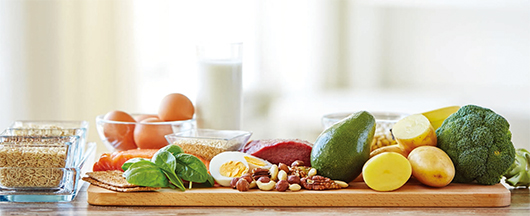
“I skipped breakfast today. Sometimes, I only eat once a day. Almost every morning, I don’t eat breakfast. Also, most of the food I eat is from convenient stores. Compared to high school, I have lost a considerable amount of weight. That's because, as I mentioned, I do not eat regularly.”
Like Hong Seung-wan (School of Business Administration, '16), most students at The University of Seoul (UOS) do not eat properly. According to a recent survey by The UOS Times about the eating habits of UOS students, about 60 percent eat two meals a day. In addition, among those students 80 percent skip breakfast.
Min Kyung-sook, a nutritionist at UOS, agreed that UOS students usually skip meals. Min said, “I know that students usually do not eat breakfast.” She can say this because she witnesses the number of students who go to the cafeteria in the morning. Min said, “There are usually about 300 students in the cafeteria. However, in the morning only a third of this number eat in the the cafeteria. When I asked the students why, they said they usually sleep in the morning because they have hangovers or school work, so they skip breakfast. I understand them, but that is not a proper diet for students.”
Even when students at UOS have meals, they are not balanced. “Students prefer meat; they do not like other kinds of food. I have noticed that fewer students visit the cafeteria when the menu does not include meat,” the nutritionist also pointed out.
She added, “I am worried that students love to eat too much food that is full of carbohydrates and salt, based on the most preferred item in the cafeteria: ramen. The line to buy ramen is always very long. Students wait almost 30 minutes to eat a bowl of ramen, but this is not healthy because it contains too many carbohydrates. The ramen soup powder is very salty and has a large amount of artificial seasoning, too. I'm concerned that students prefer to eat ramen, not rice. I wish they would eat rice rather than ramen.”
The problems of an unbalanced diet are not limited to high amounts of carbohydrates and salt. When she asked students what they eat during the day, their diets tended towards protein and fat. As previously mentioned, students eat only meat also.They do not consume fruits and vegetables that have vitamins and minerals.
She is also worried about the lack of nutrition in food at convenient stores. “I heard that most students eat lunch boxes from convenient stores these days. Most of these have meat as side dish. Also, these boxes are all refrigerated, which is less healthy than fresh foods that are cooked right away.”

What drives UOS students away from having a healthy diet?
Attending university brings great challenges and changes in every aspect of the lives of students. One of the biggest difference they encounter is in their diets, since many students become independent from their parents who previously prepared balanced meals for them. However, during this period of transition forming balanced eating habits is extremely necessary because their diets during this period have a significant effect on the ways they will eat in the future.
Most students already know this and many other important reasons to have a balanced diet. However, two out of ten of university students in Korea are in an extremely unbalanced nutritional status, according to a doctoral thesis by Dr. Cho Jeeye (A Study on Dietary Life, the Physical Status of University Students by Dietary Habits and Body Mass Index Classification and Suggestions of Nutrition Education Program Model Development, 2011). What drives us away from having a healthy diet? Here is a survey of UOS students about their eating habits.
No time, no money
Students often prepare food by themselves, especially those who live alone. However, a lot of them don't prepare proper meals and just buy whatever food is easiest to get around them. Because students have limited time and money, it is difficult for them to cook well-balanced meals every day. According to the survey on the eating habits of students at UOS, a lot of students who live alone prefer foods that do not take very long to make and eat, such as three-minute microwave meals or instant noodles. Nutritionist Min responds, “Students love instant food, such as ramen and lunch boxes, the most. However, as I mentioned, these contain too many carbohydrates and chemical seasonings that are much higher than the recommended daily nutritional requirements. Also, students usually buy fruit-juice to be healthy but the problem is some of them contain too much sugar. So, they have to beware of what they are drinking, as well.”
Group work hinders the lives of students
University students are frequently required to work with others, such as in team projects, club activities, and contests. Participating in these groups requires the members to spend a certain amount of their time together. Hence, it is usually impossible to set a schedule that satisfies everyone. Some members usually have to sacrifice and rearrange their schedules for these group activities, and this causes irregularities in their lifestyles, according to Dr. Cho’s study.
“During semesters, I gain weight,” said Lee Jung-han (Dept. of Mechanical and Information Engineering, '15). He explained, “I belong to two groups: one is the Central Club, and the other is a club activity for my major. When I participate in these groups, we talk about a lot of things, so it is hard to eat regular and proper meals. Sometimes, late at night after our meetings, we often order pizza, chicken, and other fast food. Also, we often go for get-togethers and drink alcohol. The next morning, I feel guilty for not taking care of my health.”
What kinds of effects of bad eating habits have?
Many people know that bad eating habits lead to negative consequences. Specifically, what kinds of impacts do they cause?
First, an unbalanced diet can harm your immune system. According to KyeongGi Ilbo, the types of food people eat and their nutritional states can affect their immune systems because cells in the human body are made by and do work based on the food that is taken in every day. As a result, if people are undernourished, their cells will not grow well. This leads to the body becoming vulnerable to infectious diseases. The close relationship between malnutrition and harm to the immune system can be found in many recent studies as well.
Second, an unbalanced diet can cause chronic diseases. According to a research paper entitled “Differences in Solo Eating Perceptions and Dietary Behaviors of University Students by Gender”, most foods sold at convenient stores have an enormous amount of artificial seasonings. These seasonings are used to protect the food from spoiling. However, when various seasonings are mixed together, like the ones in lunch boxes at convenient stores, the side effects to humans are not noticeable. Therefore, these seasonings can lead to chronic diseases like diabetes and high blood pressure.

Third, bad eating habits can lead to obesity. According to a report from The Korea Daily, when people skip breakfast they tend to compensate for that loss of nutrition in other ways in their diet. Therefore, people who skip breakfast tend to eat greasy, high-calorie food during their other meals in order to get the energy they did not get in the morning. However, this is not the end of the problem. After eating these high-calorie foods, people cannot have the next meal properly. This causes a vicious cycle, which leads to obesity. When people do not eat breakfast, they have not consumed anything from the time of their supper the late at night before to lunch the next day. This is about 6 to 7 hours. In this situation, the human body gets its protein from muscle, and this leads muscles to weaken. Also, when a person loses muscle, his or her basal metabolism decreases. So, when this person eats a normal amount of food, the chances that he or she gains weight increase. This has been the experience of both of our interviewees, who told us that they gained weight and felt their muscles get smaller. Also, they complained about dizziness.
Fourth, students cannot focus on studying when they do not eat proper meals. According to Daegu Ilbo, if students skip a meal and stay on an empty stomach for a while, their sympathetic nerve system activates. After this, people easily get nervous and fatigued. This leads to poor studying, especially during exam periods.
“I agree that I cannot concentrate on studying when I do not eat. Also, when I ride a bicycle on an empty stomach, I can feel that my physical strength has decreased,” said interviewee Hong, who has suffered the same circumstances mentioned above.
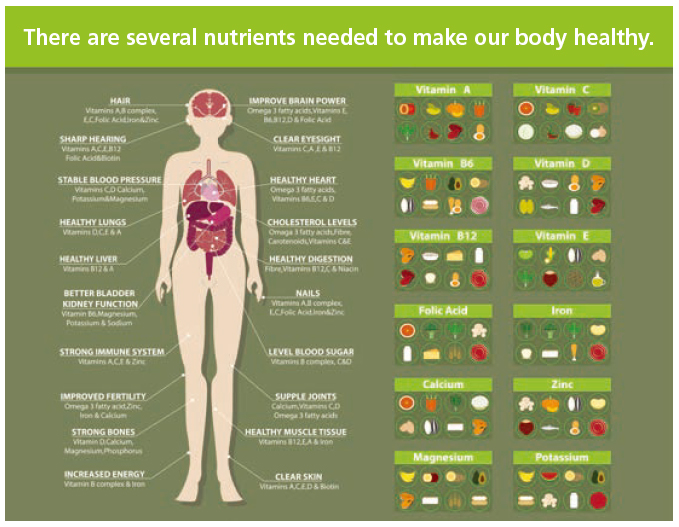
What should UOS and students do?
To improve the eating habits of UOS students, efforts from both the University and each individual student are needed. Therefore, let us examine what kind of approaches UOS can provide to its students and what kind of efforts are needed for individual students to improve their diets. Also, through interviews with and questionnaires from UOS students, some useful tips will be introduced.
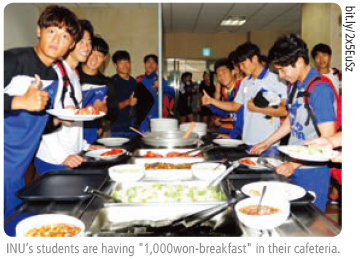
Conduct campaigns for breakfast
According to the survey of UOS students, 80 percent skip breakfast. When you consider the importance of breakfast written about above, students should seriously recognize this problem and make attempts to improve the situation immediately. For this purpose, UOS should create a variety of campaigns to encourage the students to eat breakfast.
Some other universities have already conducted such campaigns. For instance, Incheon National University (INU) reported that the number of students who eat breakfast has increased by three since they initiated a “1,000 won-breakfast” campaign, providing breakfast to their students for a cheap price. A lot of other universities that have implemented similar programs have also reported that their students showed very positive responses and have experienced better concentration during their morning classes.
Let us eat together
For most university students, it is hard to cook breakfast during semesters; this is especially true when they have classes in the morning. According to our survey and interviews, only a few respondents ascribed the problem to limits in time; rather, the majority blamed idleness and a lack of will. Therefore, students have to work on their powers of will and that will consequently improve their eating habits.
Students can improve their eating habits by voluntarily creating a community to provide motivation towards healthy eating habits. The advantage of working together as a group is that each participant takes on some responsibility if they share a common goal. Coming together in this way leads to better results with their will power because they will show up every morning to have a meal with other members. Additionally, the school can support such a group with some incentives such as giving bulk discounts on meal tickets in the cafeteria or providing a space for their group activity. This will give members of the group more reason to take part in the activities.
Furthermore, if the community is flexible when receiving new members, whether they are temporary or permanent, and if it uses an easy-to-access means of communication like Facebook, it will be easier for students to join without any sense of discomfort. All of these advantages will create a synergy and will contribute substantially to better eating habits for UOS students.
Tips for Proper Diets of the UOS Students
Home Meal Delivery Service

Our interviewee Hong told us, “I used to consume a lot of lunch boxes from convenience stores at first, but after I learned about a meal delivery service, I now prefer to use this service for meals. The price of this service is 100,000 KRW per month, with one meal provided every weekday, which is relatively reasonable considering the prices of lunch boxes and food outside the campus. The meals are delivered at the same time during the week, so it helps me to form regular eating habits. The food is also made from fresh and balanced ingredients, which is very healthy. You could even say that it is like healthy food from your own home.”
Food Package
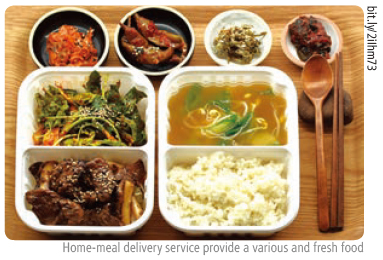
Yoo Hong-bi (Dept. of English Language and Literature, '17) said, “If I have spare time, I often make fresh-squeezed juice, but if not, I purchase something like a juice box that contains my daily required nutrients. Also, I buy a single-serve salad lunch box for my vegetable intake.”
Wise Shopping Habits
Min, the nutritionist, gave specific guidelines to UOS students when they are shopping for food. She said, “I recommend that they increase the amount of fruits and vegetables they eat. To do this, they can find small packages in many stores. This is less burdensome than preparing an entire meal for only one person, and they can also buy meat in a small amount; something like 300 ~ 400g.”
Tips from the internet
Because students eat and prepare their meals for only themselves, they often have a large amount of leftovers. This is a huge problem if they do not manage these leftovers well, especially during the summer. However, if they pay a little more attention, they can manage their food wisely and eat healthy and delicious meals.
To keep them fresh, leave vegetables and fruit as they are
Vegetables and fruit can go bad more quickly once they are washed.
Notice which vegetables should be kept at room temperature or in the refrigerator
Potatoes and sweet potatoes are appropriate to keep at room temperature Lettuce, veggies with long leaves, and hard fruit, such as apples and pears, can be kept in the refrigerator
Beware of which ingredients or fruit should be bought in small amounts
Vegetables with short leaves or cucumbers can go stale easily, so it is wise to purchase a single amount for each meal. This idea can also be applied to softer fruits that have a lot of sugar, such as strawberries and bananas.
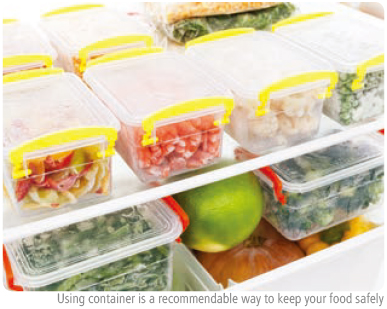
Keep a variety of containers handy
You can reuse food containers with covers, like from cottage cheese, coffee, or jam, to preserve food. Zippered bags also work well and can be washed and reused.
To keep leftover rice, seal the rice in a container for each meal
Even leftover rice can be reheated and still taste good. To do this, store the rice in a sealed container and sprinkle some water inside. Later, when you want to eat it, just cook the rice in its container in the microwave for 3 ~ 4 minutes. The moisture from the water helps it taste just like fresh-cooked rice.
Recipes for Simple and Well-Balanced Meal
Some of UOS students give the UOS Times several recipes to cook. Those recipes are really simple and require only several ingredients. You can try at home!
1. Gambas al ajillo
Ingredients: shrimp (You can buy freezed shrimp at supermarket), garlic, olive oil (other kinds of oil are okay)
First, put oil in a frying pan.
Second, if the oil is warm enough, add garlic (the garlic should be chopped or ground).
Third, stir-fry the garlic a little bit, and then add shrimp.
Fourth, when the shrimp is cooked, turn off the gas and eat!
Tip: If you like spicy food, you can add pepper. Also, you can eat bread with the oil that is leftover.
It is really simple food that can be cooked in several minutes. Try it if you can buy shrimp at the supermarket!
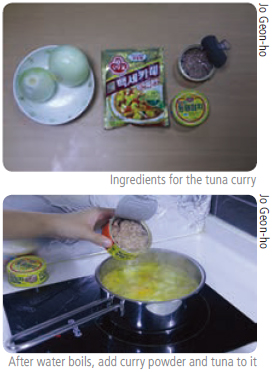
2. Tuna Curry
Ingredients: a can of tuna, curry powder (cube curry is okay), onions
First, Fry the onions with oil (the onion should be sliced beforehand).
Second, add water to the frying pan.
Third, when the water begins to boil, add the tuna and curry powder.
Fourth, reduce the heat and eat!
Tip: If you do not like oily food, pour out the oil in the tuna can before you add it in the frying pan.
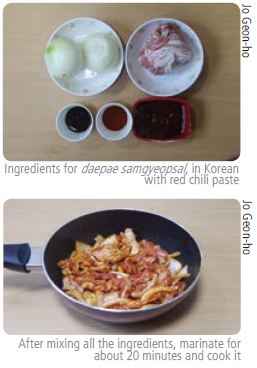
3. Grilled thin pork belly (daepae samgyeopsal, in Korean) with red chili paste (gochujang, in Korean)
Ingredients: daepae samgyeopsal, onions, salt, pepper, powdered red pepper, soy sauce, gochujang
First, mix the gochujang, powdered red pepper, and soy sauce.
Second, sprinkle the salt and pepper on the daepae samgyeopsal, and then add the sauce made in step 1.
Third, add onions and other vegetables (if you have them), and let it marinate for about 20 minutes for seasoning
Fourth, heat it in the microwave about 3 minutes. You can fry them also. When it is cooked enough, you can it!
Jung Jae-in
zanej0418@uos.ac.kr
Jo Geon-ho
edendh27@uos.ac.kr

